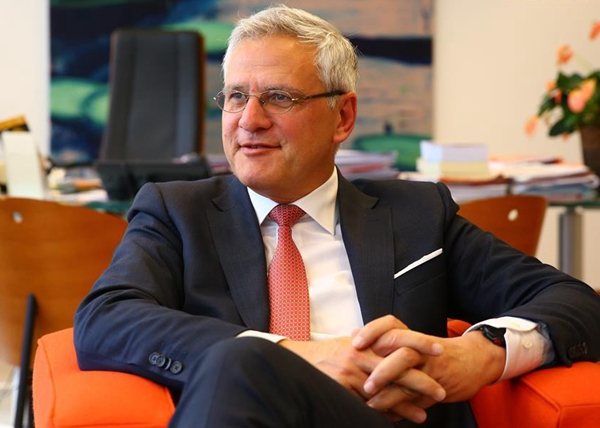Belgium eyes tapping into China's B&R Initiative

Belgian Deputy Prime Minister Kris Peeters reacts during an exclusive interview with Xinhua in Brussels, Belgium, April 19, 2017. (Xinhua/Gong Bing)
The success of China's Belt and Road Initiative hinges on the involvement of all stakeholders and Belgium is willing to team up with Beijing and other international partners to contribute to the initiative, Belgian Deputy Prime Minister Kris Peeters told Xinhua in a recent exclusive interview.
The Belt and Road Initiative was proposed by China in 2013 and aims to build a trade and infrastructure network connecting Asia with Europe and Africa along ancient trade routes.
Hailing the Belt and Road Initiative as "a grand vision," Peeters said it can succeed "if an open and inclusive approach is adopted."
"In order to be successful, they must be developed together with all stakeholders, not only with national and regional governments and economic operators, but also with the local communities who will be most directly affected," Peeters noted.
As regards infrastructure interconnection, a key part of the Belt and Road Initiative, Peeters said "infrastructure projects that boost our efforts to achieve an uninterrupted flow of goods, energy and information, are what Asia, Africa and Europe need."
But he cautioned that it is important to ensure that all sides have an equal and fair chance to benefit from the opportunities brought by the initiative.
With respect to trade facilitation, he said the urgent and necessary task is to create a level-playing field based on full adherence to market rules and international norms.
What is more, he highlighted the importance of people-to-people bonds when forging ahead with the initiative, saying "linking countries means linking people, through better infrastructure and increased communication and through cooperation in tourism, culture and education."
He argued that these exchanges are more important than ever before, at a time when "too many populists talk about building new walls instead of new bridges."
Regarding the role Belgium plays under the initiative, the vice prime minister made a clarion call that Belgium wants to contribute to its success, together with international partners and "first and foremost China."
This willingness was clearly born out in late March, when Belgium, along with 11 other countries and Hong Kong, joined the Asian Infrastructure Investment Bank (AIIB), an important pillar of the Belt and Road Initiative, catapulting the total members of the AIIB to 70.
"We believe that the AIIB has the ambition to set the example for other development banks in China and abroad by adopting sound global standards with respect to economic viability, fiscal sustainability, climate and environment-friendliness and social sustainability," Peeters said.
He stressed that "it's been evident in the selection of the first projects since the AIIB started its work."
He also noted that the AIIB is actively seeking partnership with other multilateral banks such as the Asian Development Bank, the World Bank and the European Investment Bank.
"We see this as a demonstration of our common belief that connectivity networks in Asia and between Asia and Europe will not be designed in isolation but will fit in other developing plans," he said.
"Belgium is therefore proud to be part of the first expansion of the membership of the AIIB," he said.
Apart from being the newest member of the AIIB, Belgium is eyeing riding the wave of the initiative, drawing on its role of "logistics hub in Europe."
"One third of Trans-European Network Corridors intersect here, so there are plenty of opportunities for Chinese economic operators to lock into this well-developed European transport network that is fast developing eastwards," Peeters said.
He noted that there is already a railway link from China's southwestern city of Chongqing to the Port of Antwerp, and there will be another one linking China's northeastern city of Daqing to the port of ZeeBrugge soon.
"I will go to Daqing next month to witness the departure of the first freight train to Zeebrugge," he said.
He also revealed that the civil aviation authorities of the two countries are mulling over expansion of air connections, saying" Belgians are curious about China and a growing number of Chinese are interested in Belgium."
"The number of Chinese tourists, students and business people coming to Belgium is growing, and our consular offices in Beijing, Shanghai and Guangzhou have to work almost around the clock to meet the growing demand," he said.
What's more, Belgium is thinking about ways to enhance people-to-people bonds by facilitating the exchange of students, researchers and trainees, he said, on the heels of hailing that the two countries have witnessed high-level visits in the last couple of years.
Recalling his previous visits to China, he said that although it is not possible to stay long, "but each time it's for me a very positive experience to go to China to speak, to listen and to learn."
Peeters has been invited to the Belt and Road Forum for International Cooperation to take place from May 14 to May 15 in Beijing.
Asked what message he would like to send to the forum, Peeters said, "Let's work together in a spirit of inclusiveness and mutual respect, to bridge the physical, commercial, digital and human distances among us to the benefit of all."


